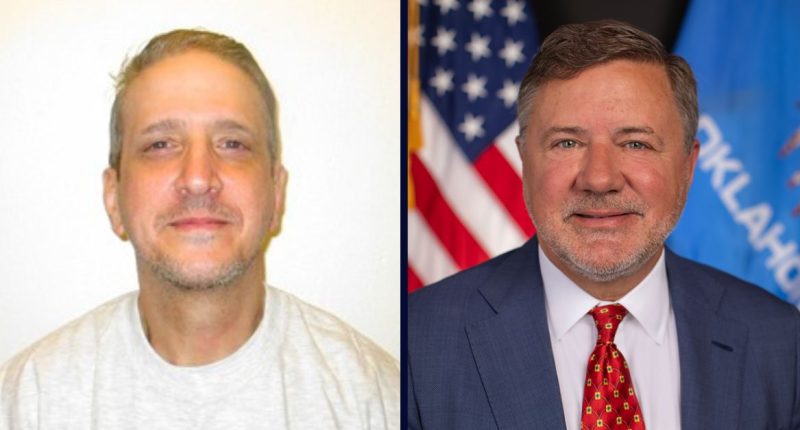Share this @internewscast.com
Left: Richard Glossip (Oklahoma Department of Corrections). Right: Oklahoma Attorney General Gentner Drummond (Office of the Attorney General).
Almost 30 years post-conviction, an Oklahoma inmate, once on death row, is set to have a new trial as the U.S. Supreme Court nullified the guilty verdict due to prosecutorial misconduct.
This time around, though, the death penalty will not be considered for Richard Glossip, now 62, as stated by Oklahoma Attorney General Gentner Drummond announced Monday.
Glossip had been convicted twice and condemned to death for the 1997 murder of Barry Van Treese, an Oklahoma City hotel owner who was his employer. The prosecution claimed that Glossip hired someone to kill Van Treese with a baseball bat.
But when Drummond took office in 2023 he ordered a review of the case which found “found multiple instances of trial error casting doubt on the fundamental fairness of the conviction,” the AG’s office said. Drummond subsequently filed a motion with the Oklahoma Court of Criminal Appeals to toss Glossip’s conviction. When the appeals court denied the request, the case went to the U.S. Supreme Court which threw out the guilty verdict.
“While it was clear to me and to the U.S. Supreme Court that Mr. Glossip did not receive a fair trial, I have never proclaimed his innocence,” Drummond said in a statement. “After the high court remanded the matter back to district court, my office thoroughly reviewed the merits of the case against Richard Glossip and concluded that sufficient evidence exists to secure a murder conviction. The same United States Constitution that guarantees our rights also ensures the rights of the accused. Unlike past prosecutors who allowed a key witness to lie on the stand, my office will make sure Mr. Glossip receives a fair trial based on hard facts, solid evidence and truthful testimony.”
Prosecutors will be seeking a life prison sentence for Glossip if convicted. A court date is scheduled for June 17.
As Law&Crime previously reported, the U.S. Supreme Court in February avoided deadlock with a fractured 5-3 decision to give Glossip, whose execution has been rescheduled nine times, a new trial, finding that the prosecution violated its legal obligations.
The majority opinion was authored by Justice Sonia Sotomayor and joined in full by Chief Justice John Roberts and Justices Elena Kagan, Brett Kavanaugh, and Ketanji Brown Jackson. Justice Clarence Thomas issued a lengthy dissent which was joined by Justice Samuel Alito. Justice Amy Coney Barrett concurred in part and dissented in part, and Justice Neil Gorsuch did not participate in the case.
Glossip was convicted in 1998 for Van Treese’s murder, then sentenced to death. Justin Sneed was the person who actually killed Van Treese, but prosecutors maintained that Glossip paid Sneed to carry out the killing. Sneed had a history of drug abuse and bipolar disorder that was not disclosed to Glossip’s lawyers by prosecutors.
Sneed later told fellow inmates that he acted alone to rob Van Treese with the plan that he and his girlfriend would use the robbery funds to buy drugs. Glossip has always maintained his innocence.
Glossip was set to be executed in 2015, but the execution was halted after prison officials realized they received the wrong lethal drug for the execution. After similar issues with other problematic executions, Oklahoma paused all executions for six years.
During the hiatus, a review of Glossip’s case revealed “significant evidence of government misconduct and destruction of evidence” that likely led to Glossip’s conviction. Among other things, independent investigators concluded the prosecution had deliberately destroyed “key physical evidence” before Glossip’s retrial and knowingly allowed Sneed to give false testimony against Glossip at trial.
Gov. Kevin Stitt, a Republican, temporarily stayed Glossip’s execution to allow his appeal to proceed. In 2023, Drummond petitioned to get Glossip a new trial over the objection of both the victim’s family and the Oklahoma District Attorneys Association.
With the case before the Supreme Court, five justices sided with Glossip and ordered that he be granted a new trial. Barrett said she would have sent the case back to a lower court for further consideration rather than ordering a new trial outright. The majority based its decision on a finding that the prosecution’s failure to correct Sneed’s testimony and withholding of key evidence violated Glossip’s due process rights.
Thomas, however, saw things quite differently — and wrote a lengthy 44-page dissent, joined by Alito.
Thomas said that the rejection of Glossip’s appeal by the Oklahoma Court of Criminal Appeals (OCCA) and the denial of clemency by Oklahoma’s Pardon and Parole Board, “should have marked the end of the road for Glossip,” because the Supreme Court lacks the power to override those decisions. He slammed the Court’s majority, saying it “stretches the law at every turn to rule in his favor,” and “concocts federal jurisdiction by misreading the decision below” and finding a due process violation based on “patently immaterial testimony” related to Sneed’s mental condition.
In his dissent, Thomas recounted several details about Glossip’s case to ostensibly make the point that the man is not — as the Oklahoma attorney general and many others have contended — innocent. Thomas pointed to Glossip’s behavior the day of the murder, his statements to others that he committed the crime, and steps Glossip took to cover up the killing.
Thomas minimized the relevance of the independent investigation into Glossip’s prosecution, writing that Reed Smith, the law firm that conducted the investigation, had been commissioned by “a group of Oklahoma legislators opposed to [Glossip’s] execution,” and is a firm “publicly committed to ‘fighting the death penalty.””
Reed Smith’s report, said Thomas, was found by various Oklahoma officials to be, “built on assumptions, half-truths, and (in some cases) outright falsehoods.”
Thomas was also unimpressed with Drummond’s involvement in the case, noting that during Drummond’s first month in office, he appointed a personal friend and campaign donor as independent counsel to reexamine the legitimacy of Glossip’s conviction.
Thomas also chastised the majority for exceeding its jurisdiction by second-guessing the Oklahoma state courts’ judgments, calling the majority’s interpretation of applicable precedent “incoherent.”
The justice argued that any evidence left out of Glossip’s trial, such as Sneed’s mental illness would not have affected the trial. Further, he said, Glossip’s defense team was “well aware” of Sneed’s diagnosis and chose not to use it during trial.
“As appellate judges examining a cold record 20 years after the trial, we should be wary of believing that we understand the import of evidence better than Glossip’s counsel,” warned Thomas.
Thomas took issue not only with the majority’s analysis and conclusion, but also with the remedy it afforded Glossip. The error, said Thomas, is “indefensible,” and Glossip is not entitled to a new trial; instead, Thomas wrote, the majority should have at most vacated the decision below and remanded back to state court.
Thomas ended his lengthy dissent with an extended reprimand for his fellow justices over how they treated the victim’s family via its ruling.
“After having bent the law at every turn to grant relief to Glossip, the Court suddenly retreats to faux formalism when dealing with the victim’s family,” Thomas wrote, dismissing that the justices’ reasoning for refusing to allow the victim’s family to participate in oral arguments.
Thomas wrote that, “even if the family had no formal right to be heard, any reasonable factfinder plainly could consider the account of the evidence that the family has brought to light, making the majority’s procedural objections beside the point.”
“Make no mistake,” he continued, “The majority is choosing to cast aside the family’s interests. I would not.”

















